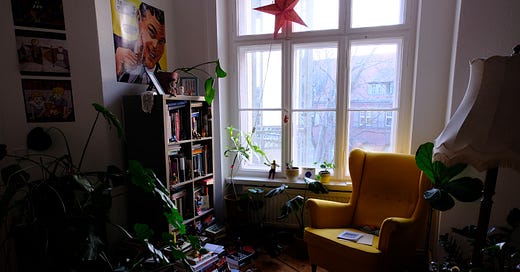#37 Katarina Gotic, artist & poet
'I prefer shorter, more common words because they are easier to work with rhythmically'
Katarina Gotic was born in Gradiška, a small town in the north of Bosnia and Herzegovina. She studied Psychology in Banja Luka and then moved to Tübingen, Germany, to study Neuroscience. Since then, she worked as a teacher, researcher, quality and risk manager, medical writer, and (finally) a poet. In 2024, Katarina published her first poetry book, ‘we need a breathing tongue between’ (kith books). She is completing her language/visual collage ‘leerlauf' and beginning a hybrid translation project of Celan’s 'Atemwende’. Katarina is the recipient of the 2023 Arbeitsstipendium für nichtdeutsche Literatur, awarded by the Berlin Senate, and a finalist of ZVONO and PAF awards for contemporary Bosnian-Herzegovinan art. She lives and works in Berlin.
Where do you write?
I would distinguish between writing-as-composing and writing-as-collecting. The first type, writing-as-composing, is something I always do at home, alone in a room: I close the door and read my words aloud. When I write to collect, I collect everywhere: in the street, in public transport, during a movie or a conversation. For me, these are two entirely different processes—writing-as-collecting is an aid to memory while writing-as-composing is a creative act. Without the collection, without the collected material, there is no composition. Without the composition, we are only left with the collected: not a poem but a heap of words.
What can we always find on your desk?
It depends on where I write. If I’m in the kitchen, I probably have a cutting board, a wooden spoon, and a large hibiscus plant that is rarely blooming. If I’m in the living room, I probably have two propagated monstera plants, an 80s toy robot that moves in a circle, a couple of fallen plastic soldiers, and a layer of dust that never seems to leave this apartment.
Morning writer or late-night words?
Sleeping, ideally!
Coffee, tea, nibbles?
None—I tend to make myself as uncomfortable as possible when I write. I’m a fan of hard chairs, white walls, empty documents, and unstretched limbs. Maybe I’m trying to reduce my body to its primal feelings of pleasure and displeasure, to liberate the mind, or elevate the writing process to a more sacred realm (read this as a joke). Maybe it’s all a byproduct of what must be a long-learned discipline, reaching the 70s and my mother’s strict Yugoslav upbringing, the 40s and my grandmother’s strict Partisan upbringing. Whatever the reason, I’m stuck with it—forever uncomfortable among the slow-cooking pots and green leaves of a rarely pink hibiscus plant.
What's your most tempting distraction?
The Internet, without a doubt, although I often write news headlines and extracts of texts into my poems. There is so much crap online and, when taken out of context, it can and does become poetry. Some of my dearest poems were composed of text I found online. In a way, this shifts the responsibility from being an artist to being a curator.
What's that we hear on the speakers?
Nothing, I write in silence.
Have you got any pre-writing rituals?
I just drag myself to the desk and open ‘leerlauf_a5_w_images’. Recently, I’m trying to balance this with short bursts of 'oman_bez_glagola’, my on-and-off novel without verbs. Most recently, leerlauf is getting replaced by ‘mijenadaha', a poetic essay/translation/autobiography of Celan’s ‘Atemwende'.
Perfect bookshop to hide on a rainy day?
I can only hide there where I’m not expected to buy something. At this point, my choices are limited to libraries and churches. As Berlin’s quiet, barren churches aren’t exactly my thing, I’ll go with the Staatsbibliothek (either version).
What's your most treasured book?
It must be the selected poetry of Arthur Rimbaud, published in 1982 in Sarajevo and stolen from my local library some 15 years ago. I first read Rimbaud in high school and liked his poetry so much that I even tried to emulate his 19th-century handwriting. Even today, I’m stuck with his end-of-the-word d, carved above and towards the preceding letters. The book I have, ‘POEZIJA', is hardcover and dark blue. A lighter weeping willow weeps the middle.
Favourite word in the English language?
I like them all. When I write, I prefer shorter, more common words because they are easier to work with rhythmically. In general, my working dictionary is quite reduced. Linguistically, I’m a poet of the people. Formally, not at all.
Dream writing location?
A terrace of a stone house somewhere in the hills of Umbria. Whether I’d get anything done there is a different question.
Three writers (dead or alive) to have dinner with?
Not being good at dinners, I’d trade them all for a dernek with my childhood friends.
One poem that has changed your life:
Gertrude Stein left a lasting impression on me, as did ‘Stein 100: A Feather Likeness of the Justice Chair’—Jackson Mac Low’s extractions from ''Tender Buttons’. I remember weeping to Bob Perelman’s 'Chronic Meanings', but most of the ex-Yugoslav war-torn poetry left me unmoved. I’m in love with Paul Celan’s later works, starting with ‘Atemwende' and the idea of trying to restructure a mother tongue. But ultimately, Lyn Hejinian’s 'My Life’ changed my life and made me want to become a poet.







